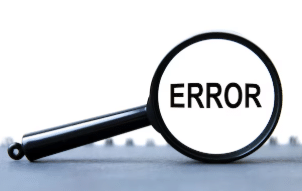Error Detection | English Language Preparation for CUET UG PDF Download
| Table of contents |

|
| Introduction |

|
| Common Types of Errors |

|
| Error Detection Practice Questions |

|
| Conclusion |

|
Introduction
Error detection assesses a student's ability to identify and correct grammatical mistakes in a sentence. Errors may appear in subject-verb agreement, tenses, articles, prepositions, pronouns, conjunctions, adjectives, adverbs, and sentence structure.
Mastering error detection not only helps in exams but also enhances writing and communication skills. In this document, we will discuss the common types of errors, strategies to detect them, and provide examples with solutions.

Common Types of Errors
1. Subject-Verb Agreement Errors
The verb must agree with the subject in number and person.
Example:
Incorrect: The list of books are on the table.
Correct: The list of books is on the table.
2. Tense Errors
The tense used in a sentence should be consistent.
Example:
Incorrect: She goes to school when she was young.
Correct: She went to school when she was young.
3. Articles (A, An, The) Errors
Using definite and indefinite articles incorrectly can change the meaning of a sentence.
Example:
Incorrect: He bought an apple and a orange.
Correct: He bought an apple and an orange.
4. Preposition Errors
Incorrect use of prepositions can change the meaning of the sentence.
Example:
Incorrect: She is married with a doctor.
Correct: She is married to a doctor.
5. Pronoun Errors
A pronoun must match its antecedent in number, gender, and case.
Example:
Incorrect: Each of the players did their best.
Correct: Each of the players did his/her best.
6. Conjunction Errors
Conjunctions help in connecting clauses correctly.
Example:
Incorrect: He is both intelligent as well as hardworking.
Correct: He is both intelligent and hardworking.
7. Adjective and Adverb Errors
An adjective modifies a noun, while an adverb modifies a verb, adjective, or another adverb.
Example:
Incorrect: She speaks fluent English.
Correct: She speaks fluently in English.
8. Redundancy Errors
Avoid using unnecessary words that repeat the same meaning.
Example:
Incorrect: The reason why he left is because he was sick.
Correct: The reason he left is that he was sick.
9. Incorrect Word Usage
Words with similar spellings or meanings can be confusing.
Example:
Incorrect: The principal effected the new rule.
Correct: The principal implemented the new rule.
10. Sentence Fragment Errors
A complete sentence must have a subject and a verb.
Example:
Incorrect: Although he was tired.
Correct: Although he was tired, he continued working.
Error Detection Practice Questions
Question 1:
Find the incorrect part of the sentence.
She do not like coffee, but she enjoys tea every morning. No error
A) She do not
B) but she
C) enjoys tea every morning
D) No error
Answer: A) She do not
Correction: "do not" should be "does not" → She does not like coffee.
Question 2:
Find the incorrect part of the sentence.
The teacher suggested me to read this book as it contains important information. No error
A) suggested me
B) to read this book
C) as it contains
D) No error
Answer: A) suggested me
Correction: "suggested me" should be "suggested that I" → The teacher suggested that I read this book.
Question 3:
Find the incorrect part of the sentence.
Neither of the students were present in the class when the teacher arrived. No error
A) Neither of the students
B) were present
C) in the class
D) No error
Answer: B) were present
Correction: "were" should be "was" → Neither of the students was present in the class.
Question 4:
Identify the incorrect part of the sentence.
The committee has decided to postpone the event as they need more preparation. No error
A) has decided
B) to postpone the event
C) as they need more preparation
D) No error
Answer: C) as they need more preparation
Correction: "they" should be "it" (committee is singular) → as it needs more preparation.
Question 5:
Find the grammatical mistake in the sentence.
The shop remains open from 10 AM to 8 PM in Sundays. No error
A) remains open
B) from 10 AM to 8 PM
C) in Sundays
D) No error
Answer: C) in Sundays
Correction: "in Sundays" should be "on Sundays" → The shop remains open on Sundays.
Conclusion
Error detection is an essential skill. Understanding grammar rules and practicing previous years’ questions can improve accuracy. Regular practice, reading, and analyzing sentence structures will enhance grammatical proficiency, helping students score well in competitive exams.
|
89 videos|89 docs|92 tests
|
FAQs on Error Detection - English Language Preparation for CUET UG
| 1. What are the most common types of errors in writing? |  |
| 2. How can I effectively detect errors in my writing? |  |
| 3. Are there specific tools that can assist with error detection? |  |
| 4. What is the importance of error detection in writing? |  |
| 5. How can practice questions help improve error detection skills? |  |















